(完整word版)高中英语状语从句用法详细解析
- 格式:doc
- 大小:36.51 KB
- 文档页数:9
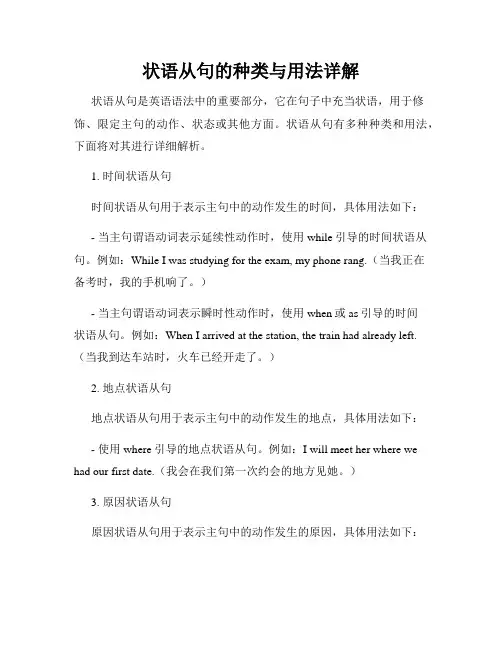
状语从句的种类与用法详解状语从句是英语语法中的重要部分,它在句子中充当状语,用于修饰、限定主句的动作、状态或其他方面。
状语从句有多种种类和用法,下面将对其进行详细解析。
1. 时间状语从句时间状语从句用于表示主句中的动作发生的时间,具体用法如下:- 当主句谓语动词表示延续性动作时,使用while引导的时间状语从句。
例如:While I was studying for the exam, my phone rang.(当我正在备考时,我的手机响了。
)- 当主句谓语动词表示瞬时性动作时,使用when或as引导的时间状语从句。
例如:When I arrived at the station, the train had already left.(当我到达车站时,火车已经开走了。
)2. 地点状语从句地点状语从句用于表示主句中的动作发生的地点,具体用法如下:- 使用where引导的地点状语从句。
例如:I will meet her where we had our first date.(我会在我们第一次约会的地方见她。
)3. 原因状语从句原因状语从句用于表示主句中的动作发生的原因,具体用法如下:- 使用because或since引导的原因状语从句。
例如:He couldn't come to the party because he had to work overtime.(他不能来参加聚会,因为他得加班。
)- 使用as引导的原因状语从句,强调两个动作同时发生。
例如:As the sun set, the sky turned orange.(太阳下山时,天空变成橙色。
)4. 条件状语从句条件状语从句用于表示主句中的动作发生的条件,具体用法如下:- 使用if或unless引导的条件状语从句。
例如:If it rains tomorrow, we will stay indoors.(如果明天下雨,我们将呆在室内。
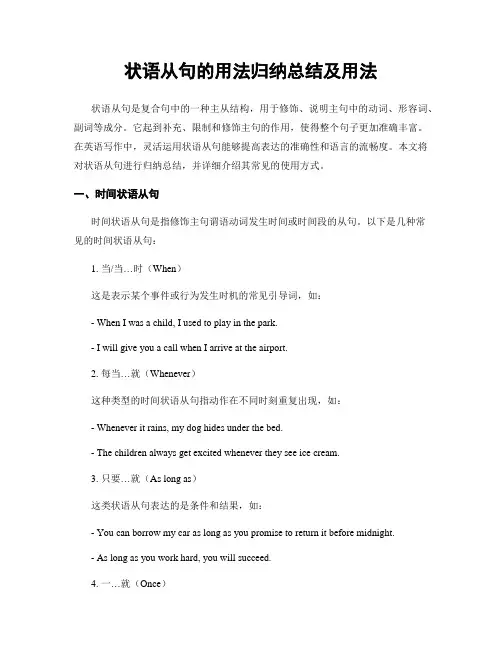
状语从句的用法归纳总结及用法状语从句是复合句中的一种主从结构,用于修饰、说明主句中的动词、形容词、副词等成分。
它起到补充、限制和修饰主句的作用,使得整个句子更加准确丰富。
在英语写作中,灵活运用状语从句能够提高表达的准确性和语言的流畅度。
本文将对状语从句进行归纳总结,并详细介绍其常见的使用方式。
一、时间状语从句时间状语从句是指修饰主句谓语动词发生时间或时间段的从句。
以下是几种常见的时间状语从句:1. 当/当…时(When)这是表示某个事件或行为发生时机的常见引导词,如:- When I was a child, I used to play in the park.- I will give you a call when I arrive at the airport.2. 每当…就(Whenever)这种类型的时间状语从句指动作在不同时刻重复出现,如:- Whenever it rains, my dog hides under the bed.- The children always get excited whenever they see ice cream.3. 只要…就(As long as)这类状语从句表达的是条件和结果,如:- You can borrow my car as long as you promise to return it before midnight.- As long as you work hard, you will succeed.4. 一…就(Once)这种类型的状语从句表示的是某件事情发生的时候立刻做出反应,如:- Once you finish your homework, you can go out and play.- Once the sun sets, darkness falls quickly.二、地点状语从句地点状语从句修饰主句中动词的地点或方向。
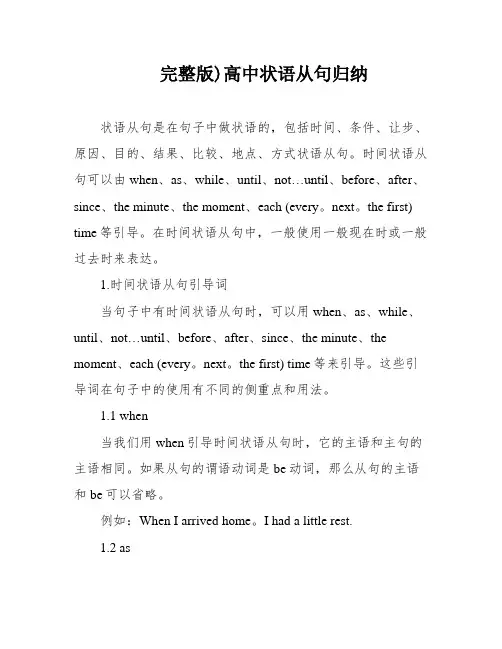
完整版)高中状语从句归纳状语从句是在句子中做状语的,包括时间、条件、让步、原因、目的、结果、比较、地点、方式状语从句。
时间状语从句可以由when、as、while、until、not…until、before、after、since、the minute、the moment、each (every。
next。
the first) time等引导。
在时间状语从句中,一般使用一般现在时或一般过去时来表达。
1.时间状语从句引导词当句子中有时间状语从句时,可以用when、as、while、until、not…until、before、after、since、the minute、the moment、each (every。
next。
the first) time等来引导。
这些引导词在句子中的使用有不同的侧重点和用法。
1.1 when当我们用when引导时间状语从句时,它的主语和主句的主语相同。
如果从句的谓语动词是be动词,那么从句的主语和be可以省略。
例如:When I arrived home。
I had a little rest.1.2 asas不仅可以表示“当。
的时候”,还可以表示“一面。
一面”和“随着”的意思。
例如:XXX(一面。
一面)You will XXX(随着)1.3 whileXXX表示“当。
的时候”,强调主句的动作和从句的动作同时发生。
从句一般使用进行时,动词必须是延续性动词。
例如:While we were working。
they were having a rest.While they were having a n。
they got very confused.注意:while也有对比的含义,可以解释为“然而”。
例如:XXX。
XXX.2.until和not。
untiluntil和not。
until都表示“直到。
才”。
在肯定句中,主句常用延续性动词;在否定句中,主句常用短暂性动词。
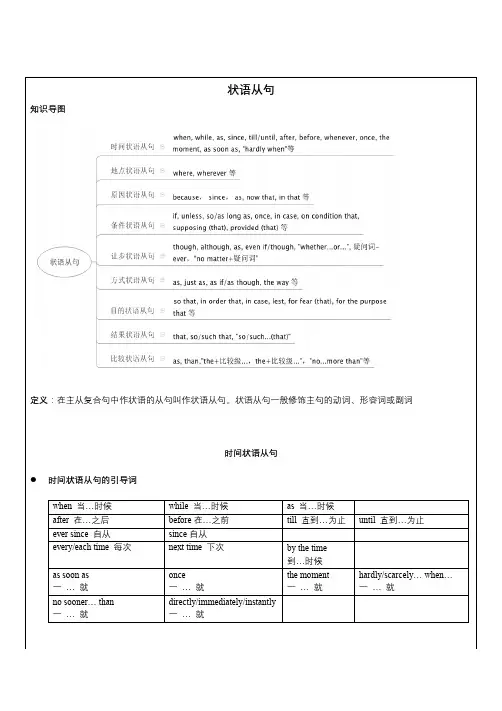
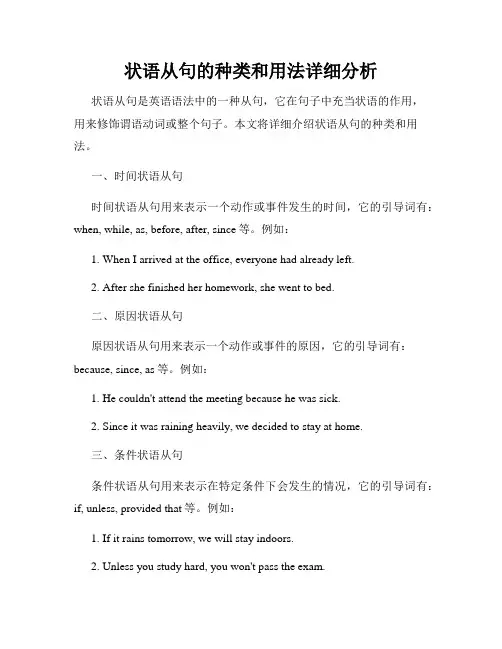
状语从句的种类和用法详细分析状语从句是英语语法中的一种从句,它在句子中充当状语的作用,用来修饰谓语动词或整个句子。
本文将详细介绍状语从句的种类和用法。
一、时间状语从句时间状语从句用来表示一个动作或事件发生的时间,它的引导词有:when, while, as, before, after, since等。
例如:1. When I arrived at the office, everyone had already left.2. After she finished her homework, she went to bed.二、原因状语从句原因状语从句用来表示一个动作或事件的原因,它的引导词有:because, since, as等。
例如:1. He couldn't attend the meeting because he was sick.2. Since it was raining heavily, we decided to stay at home.三、条件状语从句条件状语从句用来表示在特定条件下会发生的情况,它的引导词有:if, unless, provided that等。
例如:1. If it rains tomorrow, we will stay indoors.2. Unless you study hard, you won't pass the exam.四、方式状语从句方式状语从句用来表示一个动作或事件的方式,它的引导词有:as, like等。
例如:1. You should do it as I told you.2. He acted like he didn't care about anything.五、地点状语从句地点状语从句用来表示一个动作或事件的地点,它的引导词有:where, wherever等。
例如:1. I will go wherever you go.2. The children played in the park where their parents could watch them.六、目的状语从句目的状语从句用来表示一个动作或事件的目的,它的引导词有:so that, in order that等。
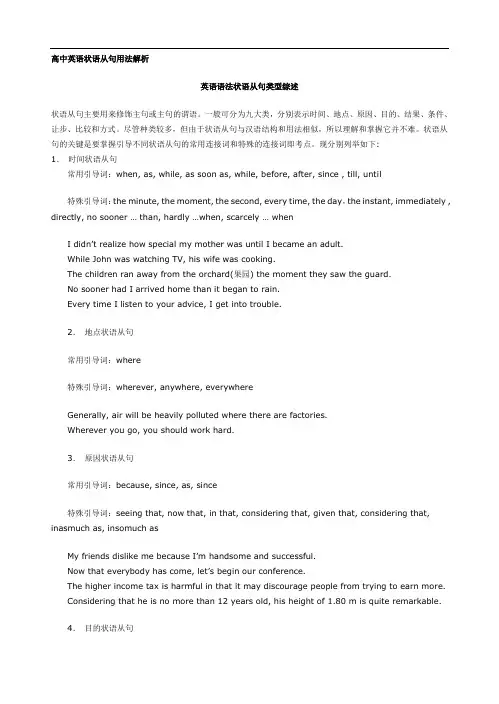
高中英语状语从句用法解析英语语法状语从句类型综述状语从句主要用来修饰主句或主句的谓语。
一般可分为九大类,分别表示时间、地点、原因、目的、结果、条件、让步、比较和方式。
尽管种类较多,但由于状语从句与汉语结构和用法相似,所以理解和掌握它并不难。
状语从句的关键是要掌握引导不同状语从句的常用连接词和特殊的连接词即考点。
现分别列举如下:1.时间状语从句常用引导词:when, as, while, as soon as, while, before, after, since , till, until特殊引导词:the minute, the moment, the second, every time, the day,the instant, immediately , directly, no sooner … than, hardly …when, scarcely … whenI didn’t realize how special my mother was until I became an adult.While John was watching TV, his wife was cooking.The children ran away from the orchard(果园) the moment they saw the guard.No sooner had I arrived home than it began to rain.Every time I listen to your advice, I get into trouble.2.地点状语从句常用引导词:where特殊引导词:wherever, anywhere, everywhereGenerally, air will be heavily polluted where there are factories.Wherever you go, you should work hard.3.原因状语从句常用引导词:because, since, as, since特殊引导词:seeing that, now that, in that, considering that, given that, considering that, inasmuch as, insomuch asMy friends dislike me because I’m handsome and successful.Now that everybody has come, let’s begin our conference.The higher income tax is harmful in that it may discourage people from trying to earn more.Considering that he is no more than 12 years old, his height of 1.80 m is quite remarkable.4.目的状语从句常用引导词:so that, in order that特殊引导词:lest, in case, for fear that,in the hope that, for the purpose that, to the end thatThe boss asked the secretary to hurry up with the letters so that he could sign them.The teacher raised his voice on purpose that the students in the back could hear more clearly.5.结果状语从句常用引导词:so … that, so… that, such … that,特殊引导词:such that, to the degree that, to the extent that, to such a degree that,He got up so early that he caught the first bus.It’s such a good chance that we must not miss it.To such an degree was he excited that he couldn’t sleep last night.6.条件状语从句常用引导词:if, unless,特殊引导词:as/so long as, only if, providing/provided that, suppose that, in case that, on condition thatWe’ll start our project if the president agrees.You will certainly succeed so long as you keep on trying.Provided that there is no opposition, we shall hold the meeting here.7.让步状语从句常用引导词:though, although, even if, even though特殊引导词:as(用在让步状语从句中必须要倒装),while ( 一般用在句首),no matter …,in spite of the fact that, while, whatever, whoever, wherever, whenever, however, whicheverMu ch as I respect him, I can’t agree to his proposal.尽管我很尊敬他,我却不同意他的建议。
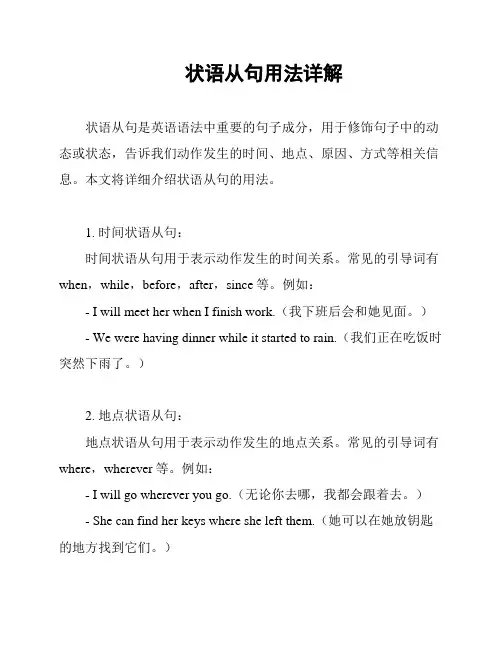
状语从句用法详解状语从句是英语语法中重要的句子成分,用于修饰句子中的动态或状态,告诉我们动作发生的时间、地点、原因、方式等相关信息。
本文将详细介绍状语从句的用法。
1. 时间状语从句:时间状语从句用于表示动作发生的时间关系。
常见的引导词有when,while,before,after,since等。
例如:- I will meet her when I finish work.(我下班后会和她见面。
)- We were having dinner while it started to rain.(我们正在吃饭时突然下雨了。
)2. 地点状语从句:地点状语从句用于表示动作发生的地点关系。
常见的引导词有where,wherever等。
例如:- I will go wherever you go.(无论你去哪,我都会跟着去。
)- She can find her keys where she left them.(她可以在她放钥匙的地方找到它们。
)3. 原因状语从句:原因状语从句用于表示某个动作或状态的原因。
常见的引导词有because,since,as等。
例如:- As it was getting late, we decided to leave.(由于时间很晚,我们决定离开。
)4. 方式状语从句:方式状语从句用于表示某个动作或状态的方式。
常见的引导词有as,like,as if等。
例如:- She danced as if nobody was watching.(她像没人看着一样跳舞。
)- He treats me like a princess.(他像对待公主一样对待我。
)需要注意的是,在使用状语从句时,需要注意主句和从句之间的时态和语序的一致性。
此外,状语从句通常位于主句之前或之后,但也可以放在主句的中间。
总结:状语从句是用于修饰句子中动态或状态的从句,用于表示时间、地点、原因、方式等相关信息。
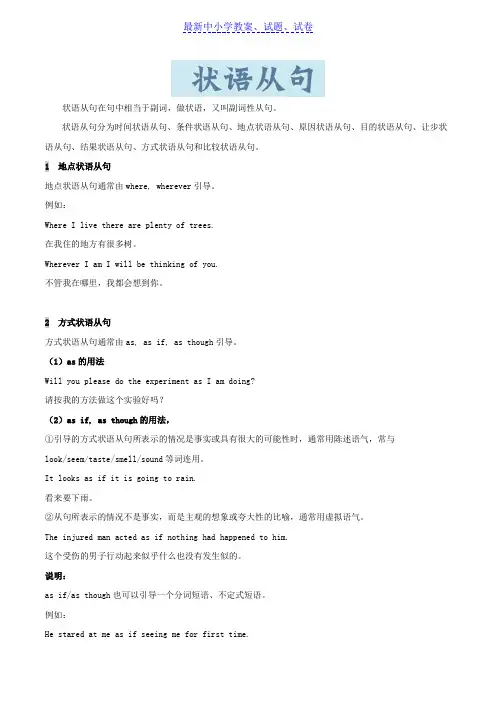
状语从句在句中相当于副词,做状语,又叫副词性从句。
状语从句分为时间状语从句、条件状语从句、地点状语从句、原因状语从句、目的状语从句、让步状语从句、结果状语从句、方式状语从句和比较状语从句。
1 地点状语从句地点状语从句通常由where, wherever引导。
例如:Where I live there are plenty of trees.在我住的地方有很多树。
Wherever I am I will be thinking of you.不管我在哪里,我都会想到你。
2 方式状语从句方式状语从句通常由as, as if, as though引导。
(1)as的用法Will you please do the experiment as I am doing?请按我的方法做这个实验好吗?(2)as if, as though的用法,①引导的方式状语从句所表示的情况是事实或具有很大的可能性时,通常用陈述语气,常与look/seem/taste/smell/sound等词连用。
It looks as if it is going to rain.看来要下雨。
②从句所表示的情况不是事实,而是主观的想象或夸大性的比喻,通常用虚拟语气。
The injured man acted as if nothing had happened to him.这个受伤的男子行动起来似乎什么也没有发生似的。
说明:as if/as though也可以引导一个分词短语、不定式短语。
例如:He stared at me as if seeing me for first time.他目不转睛地看着我,就像第一次看见我似的。
He cleared his throat as if to say something.他清了清嗓子,像要说什么似的。
3 原因状语从句because,as,since与for的不同用法:相同之处:中文都表示“因为”,均为连词。
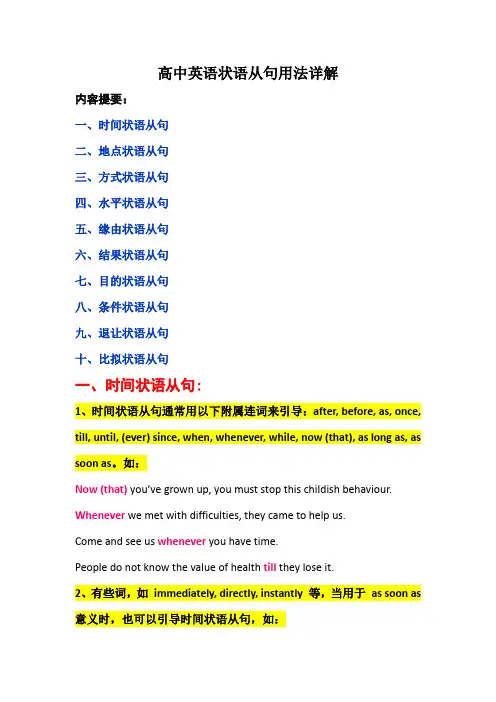
高中英语状语从句用法详解内容提要:一、时间状语从句二、地点状语从句三、方式状语从句四、水平状语从句五、缘由状语从句六、结果状语从句七、目的状语从句八、条件状语从句九、退让状语从句十、比拟状语从句一、时间状语从句:1、时间状语从句通常用以下附属连词来引导:after, before, as, once, till, until, (ever) since, when, whenever, while, now (that), as long as, as soon as。
如:Now (that)you’ve grown up, you must stop this childish behaviour. Whenever we met with difficulties, they came to help us.Come and see us whenever you have time.People do not know the value of health till they lose it.2、有些词,如immediately, directly, instantly 等,当用于as soon as 意义时,也可以引导时间状语从句,如:I got in touch with him immediately I received his letter.My sister came directly she got my message.The machine will start instantly you press the button.I’ll telephone you directly I hear the news.Will you look for it immediately you get there?3.某些表示时间的名词词组,如the (very) moment ( = as soon as ), the minute ( = as soon as ), the instant ( = as soon as ), the day, the year, the morning, every time, each time, next time, the first time 等,也可以引导时间状语从句,如:I’ll tell you about it the moment you come.I started the instant I heard the report.The instant she saw him she knew he was her brother.Every time I catch a cold, I have pain in my back.I’m going to see him next time he comes to Shenzhen.He left Europe the year World WarⅡbroke out.He had impressed me that way the first time I met him.I started the very moment I got your letter.I’ll tell him the minute (that) he gets here.4.有些关联附属连词,如no sooner …than / hardly …when / scarcely …when / barely …when 等,也能引导时间状语从句。
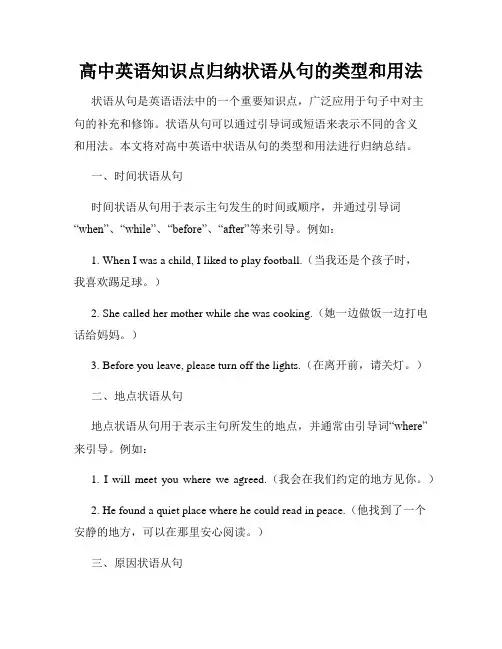
高中英语知识点归纳状语从句的类型和用法状语从句是英语语法中的一个重要知识点,广泛应用于句子中对主句的补充和修饰。
状语从句可以通过引导词或短语来表示不同的含义和用法。
本文将对高中英语中状语从句的类型和用法进行归纳总结。
一、时间状语从句时间状语从句用于表示主句发生的时间或顺序,并通过引导词“when”、“while”、“before”、“after”等来引导。
例如:1. When I was a child, I liked to play football.(当我还是个孩子时,我喜欢踢足球。
)2. She called her mother while she was cooking.(她一边做饭一边打电话给妈妈。
)3. Before you leave, please turn off the lights.(在离开前,请关灯。
)二、地点状语从句地点状语从句用于表示主句所发生的地点,并通常由引导词“where”来引导。
例如:1. I will meet you where we agreed.(我会在我们约定的地方见你。
)2. He found a quiet place where he could read in peace.(他找到了一个安静的地方,可以在那里安心阅读。
)三、原因状语从句原因状语从句用于表示主句的原因或解释,并通过引导词“because”、“since”、“as”来引导。
例如:1. He didn't go to school today because he was sick.(他今天没去上学,因为他生病了。
)2. Since it is raining heavily, we should stay indoors.(因为下大雨,我们应该待在室内。
)四、方式状语从句方式状语从句用于表示主句动作或状态的方式或方法,并通常由引导词“as”、“like”、“the way”来引导。
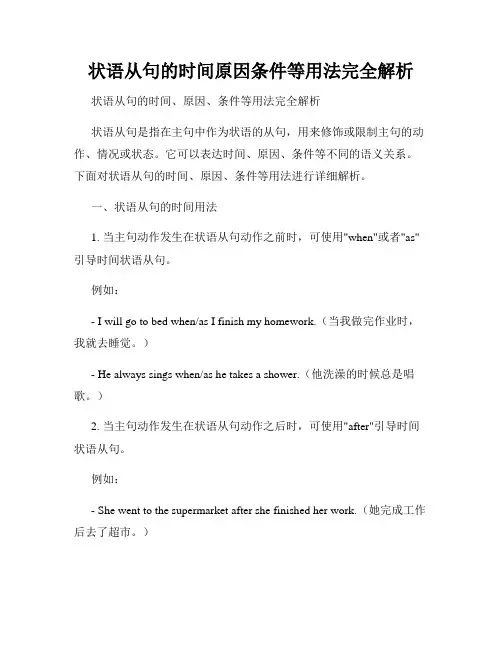
状语从句的时间原因条件等用法完全解析状语从句的时间、原因、条件等用法完全解析状语从句是指在主句中作为状语的从句,用来修饰或限制主句的动作、情况或状态。
它可以表达时间、原因、条件等不同的语义关系。
下面对状语从句的时间、原因、条件等用法进行详细解析。
一、状语从句的时间用法1. 当主句动作发生在状语从句动作之前时,可使用"when"或者"as"引导时间状语从句。
例如:- I will go to bed when/as I finish my homework.(当我做完作业时,我就去睡觉。
)- He always sings when/as he takes a shower.(他洗澡的时候总是唱歌。
)2. 当主句动作发生在状语从句动作之后时,可使用"after"引导时间状语从句。
例如:- She went to the supermarket after she finished her work.(她完成工作后去了超市。
)- They will have a party after they come back from the trip.(他们从旅行回来后会举办派对。
)3. 当主句和状语从句表示同时发生的两个动作时,可使用"while"或者"as"引导时间状语从句。
例如:- I like to listen to music while/as I am cooking.(我喜欢一边煮饭一边听音乐。
)- He reads a book while/as he is waiting for the train.(他正在等火车,一边读书。
)二、状语从句的原因用法1. 当状语从句表示原因时,可使用"because"或者"since"引导原因状语从句。
例如:- He couldn't attend the meeting because/since he was sick.(他因为生病所以无法参加会议。
状语从句详解状语从句是复句中的一种从句,用来修饰动词、形容词、副词或整个句子。
它起到进一步说明、补充或限制主句的作用。
本文将详细解析状语从句的定义、分类、用法及注意事项。
一、状语从句的定义状语从句是一个从属分句,由连词引导,在主从句之间建立一种从属关系。
它通常修饰动词、形容词、副词或整个句子,用来表示时间、条件、原因、目的、方式、程度、比较等等。
通过引导词的不同,状语从句可以分为多种类型。
二、状语从句的分类1. 时间状语从句时间状语从句用来表示动作发生的时间,在主句中起到修饰的作用。
时间状语从句常用的引导词有:when(当)、while(当...时)、before (在...之前)、after(在...之后)、as(当...的时候)等等。
例如:- I will call you when I arrive home.(我到家后会给你打电话。
)- They went to bed after they finished their homework.(他们做完作业后就上床睡觉了。
)2. 条件状语从句条件状语从句用来表示主句发生的条件,在主句中起到修饰的作用。
条件状语从句常用的引导词有:if(如果)、unless(除非)、provided that(只要)、as long as(只要)等等。
例如:- If it rains, we will stay at home.(如果下雨,我们将待在家里。
)- You can go out unless it is too cold.(除非天气太冷,你可以出去。
)3. 原因状语从句原因状语从句用来表示主句发生的原因,在主句中起到修饰的作用。
原因状语从句常用的引导词有:because(因为)、since(因为)、as (因为)、for(因为)等等。
例如:- She didn't come to the party because she was sick.(她没有来参加聚会,因为她生病了。
高中英语状语从句用法详解状语从句用法详解在主从复合句中修饰主句的动词、形容词、副词等的从句叫状语从句。
一般可分为:时间状语从句、地点状语从句、原因状语从句、目的状语从句、结果状语从句、条件状语从句、让步状语从句、比较状语从句、方式状语从句。
I 时间状语从句:起时间状语作用的从句。
(时间状语从句位置灵活,可以在句首,也可在句末)常用来引导时间状语从句的引导词有:when, while, as, after, before, until/till, since, as soon as, immediately, the moment, every time, whenever等。
1.when, while, as1) when“当......的时候”,表示主从句的谓语动作同时发生或先后紧接着发生。
I was very happy when I heard from you.收到你的信时我非常高兴。
When you deal with them, you should be cautious.跟他们打交道时,你应该谨慎。
when引导时间状语从句中的谓语动词可以用非延续性动词,也可用延续性动词。
When I was young, I went to town myself.当我还年轻时,我自己独自去城里。
(延续性动词)When I lived in country, I used to carry some water for him.我住在农村时,常常为他担水。
(延续性动词)When he received the letter, he'll tell us.当他接到信后,他会告诉我们的。
(非延续性动词)When the fire broke out, all the students were sleeping soundly.注意:当when引导的时间状语从句为系表结构,而且其主语和主句的主语一致,其表语又是一个名词时,就可以用由as引导的省略句来代替when引导的从句。
(完整版)状语从句超详细讲解状语从句是复合句的一种,它能够起到修饰主句的作用。
本文将详细讲解状语从句的定义、分类以及使用方法。
定义状语从句是一个修饰、说明主句的从句。
它能够表达时间、地点、原因、条件、目的、方式等等不同的状况或情况。
分类根据状语从句的引导词,我们可以将其分为以下几种类型:1. 时间状语从句:用于表示何时发生或发生过的情况。
常用引导词有:when, while, as, before, after, until, since, as soon as等。
2. 地点状语从句:用于表示事件发生的地点。
常用引导词有:where, wherever。
3. 原因状语从句:用于表示事件的原因。
常用引导词有:because, since, as等。
4. 条件状语从句:用于表示某种条件下发生的情况。
常用引导词有:if, unless, provided that, as long as等。
5. 目的状语从句:用于表示主句中的动作或状态的目的。
常用引导词有:so that, in order that。
6. 方式状语从句:用于表示主句中的动作或状态发生的方式。
常用引导词有:as, as if, as though。
使用方法在使用状语从句时,需要注意以下几点:1. 引导词的选择要准确。
不同类型的状语从句需要选择相应的引导词,以确保表达的准确性。
2. 状语从句的位置可以灵活调整。
可以将状语从句放在主句之前、之后或中间,但要注意语序的调整,以保证句子的通顺。
3. 使用适当的标点符号。
根据句子结构和语义需要,可以在状语从句和主句之间使用逗号、连词等标点符号。
4. 注意主从句的时态和语态一致性。
主句和状语从句之间的动作发生时间要一致,并保持相同的语态。
总结状语从句是一种修饰主句的从句,能够表达时间、地点、原因、条件、目的、方式等不同状况。
根据引导词的不同,状语从句可以分为时间状语从句、地点状语从句、原因状语从句、条件状语从句、目的状语从句和方式状语从句。
状语从句一.分类:when (当……的时候) while (在……期间) as (当……的时候, 一边……一边……)before (在……之前) since (自从……以来) till/until (直到) hardly…when… (刚……就) as soon as (一……就……)after (在……之后) not…till/until(直到……才)no sooner…than…(刚……就)地点状语从句:where (在那里) wherever(无论哪里)原因状语从句:because (因为) since (因为,既然) as (由于) for (为了) now that(既然)目的状语从句:(so)that=in order that(以便)so as (not)to (以便[不])in case(以免)lest(以免)结果状语从句:so+adj./adv.+that(如此……以致)so that(结果……)such+n.+that(如果……以致)that(所以,因此)让步状语从句:though/although不可同but连用。
though/although (虽然)however (可是)even though(即使)even if (即使)no matter+what/which/where/who/when =whatever/whichever/wherever/whoever/whenever(不论什么/哪一个/哪里/谁/何时)比较状语从句:as (正如)as…as(和……一样)not as/so … as (不如……)than(比……更)the+比较级…+the+比较级(越……越……)条件状语从句:if(假设)unless(如果不)so long as(只要)on condition that (如果)方式状语从句:as(像……那样地)just as(正像)as if(好像)as though(好像)二.各种状语从句的简化方法:1例:After she sang,she left the rich man's house.= After singing,she left the rich man's house.2.以as soon as引导的状语从句的主语若与主句主语一致时,从句等于on+doing sth.,作状语,此时的动词为非延续性动词。
状语从句的讲解就是用一句话作状语分为:时间,地点,方式,原因,结果,条件,让步,目的,比较一、时间状语从句第一次见到你一见到你我就喜欢上了你直到见到你五岁时见到你When, as, while, before, after, since, till/until, as soon as no sooner…than…scarcely…when…hardly…when… the minute the second the instant the moment by the time 截止 immediately instantly directlyeach time every time next time the first time on doing sthwhenwhile 当…时as1. when 1)当…时/ 延续性动词短暂性动词都可用2)这时/3)届时、到时I was watching TV when my cellphone suddenly rang这时When I was five years old I could speak five languagesThe wet weather will continue tommorow when a cold front is expected to arrive届时到时注意:时间状语从句中动作发生有前后时先发生的用过去完成时When my mother came back I had already gone to bed。
2. while 1)从句动词延续性2)同时发生3)对比的意味“然而”4)趁着He taught himself while he worked in a bank 延续性动词当他在银行上班时While we were working they were having a rest.对比While they were having a discussion , they got very confused。
高考状语从句知识点状语从句是高考英语中的一个重要语法点,掌握好状语从句对于理解和运用英语句子结构、提高英语语言能力有着至关重要的作用。
接下来,让我们一起深入了解一下高考中常见的状语从句类型及其用法。
一、时间状语从句时间状语从句表示时间关系,常用的引导词有 when(当……时候)、while(在……期间)、as(当……时;一边……一边……)、before(在……之前)、after(在……之后)、since(自从……)、until / till(直到……)等。
1、 when 引导的时间状语从句When I was a child, I often played in the park(当我还是个孩子的时候,我经常在公园玩耍。
)When he arrived home, it was already midnight(当他到家时,已经是午夜了。
)需要注意的是,when 引导的从句动作可以与主句动作同时发生,也可以先于主句动作发生。
2、 while 引导的时间状语从句While I was doing my homework, my mother was cooking(当我在做作业时,妈妈在做饭。
)While he was reading, his sister was singing(他在读书时,他妹妹在唱歌。
)while 引导的从句动作通常是持续性的,且主句和从句动作同时发生。
3、 as 引导的时间状语从句As I was walking along the street, I met an old friend(当我沿着街道走时,遇到了一位老朋友。
)As time goes by, we become more mature(随着时间的流逝,我们变得更加成熟。
)4、 before 和 after 引导的时间状语从句I had finished my homework before my father came back(在我爸爸回来之前,我已经完成了作业。
高中英语状语从句用法详细解析一、定义:在句中作状语的从句是状语从句,修饰主句中的动词、形容词或副词等。
状语从句由从属连词引导,从属连词在句中不充当句子成分,只起连接作用,状语从句放在句首时,要用逗号,放在句尾时不用。
二、分类根据意义上的不同,状语从句可分为:①时间状语从句②地点状语从句③原因状语从句④目的状语从句⑤条件状语从句⑥结果状语从句⑦让步状语从句⑧方式状语从句⑨比较状语从句三、时间状语从句(一)引导时间状语从句的连词有:as, when(whenever), before, after, as soon as, until(till), since, every time, once.(二)、“as” as, when, while都有“当……的时候”,可以互用When she was a child.While she was a child. She Lived in Paris.As she was a child.as有“一边…一边”的意思He sang as he walked.“when”When the clock struck twelve, all the lights went out.I was sleeping when she came in. 动补When we arrived at the station, the train had left.“while” 主、从句动作或状态同时发生。
用while引导的从句用延续性动词,常表示较长的时间或一个过程。
While we were having supper, all the lights went out.Please keep quiet while others are studying.While I was writing letters last night, he was watching TV.when, while并列连问。
when和while都可用作并列连问,连接并列分句。
When表示“就在……的时候”, while意反而,可是,表示转折。
One evening Beethoven was walking in a street, when he suddenly stopped outside a little house.并列连词引导并列句,意思是就在那时。
(三)、主句是一般将来时,时间状语从句用一般现在时表将来,主句是过去将来时,从句用一般过去时表示过去将来时,主句是一般过去时,从句用一般过去时。
1. I' ll call you when I get there.2. They said they would leave when they got the new.3. They left as soon as they got the new.Whenever 无论什么时候,随时1. Whenever someone throws in some rubbish, the truck produces a piece of music.每当有人扔进一些垃圾时,它(汽车)就放一段音乐。
2. Whenever we' re in trouble, they will help us.3. I go to the theatre, whenever I am free.4. Come and see me whenever you want to.你随时来看我。
till和until(表示“直到……”)句首多用until1、在肯定句中表示“直到……为止”,主句谓语动词要用延续性动词。
I was waiting until/till he arrived.2、在否定句中表示“直到……才”主句谓语动词常用终止性动词,这时until和till常被before替换。
I didn' t leave till/until she came back.since: 主句用完成时,从句用一般过去时,since引导的从句间或可用现在完成时。
It is two years since I have studied English.1. We have known each other since we were children.2. We have been friends (ever since) since we met at school.3. It is …… (一段时间)+since+一般过去时态句子。
It is two years since my sister married.……(一段时间) have/has passed since +一般过去时态句子Two sisters have/has passed since my sister married.Since+时间点1. I have been at home since three o' clock this afternoon.2. Maria has been in China since two years ago.*every time, each time, next timeEvery time you get back at night, you drop your boots on the floor. Every time I catch cold, I have pain in my back.(every time 分写不可以合写) 比较everyday (adj) 日常的,普通的every day 是名词短语,每天,天天Next time I go there, I will visit them.* once 一旦…就Once you begin, you must go on. 你一开了头,就应该继续下去。
四、地点状语从句地点状语从句用where, wherever引导We should go where the people need us.我们应该去人民需要我们的地方。
Where there is a will, there is a way. 有志者,事竟成。
Wherever they went, they received a worm welcome.无论他们走到哪儿都受到热烈欢迎。
She follow him whose he goes. 他无论到哪里她总跟着。
五、原因状语从句原因状语从句用because(因为),since(既然), as(由于)引导1、字母由多到少,语气由强到弱。
2、由why提问必须用because回答。
Since, as不回答why的提问,而且从句一般放在句首,because一般放在主句之后。
3、 before of +名词Because of the rain, we didn' t go to the park.4、 because 和so不可连用,只能选其一。
(另有although, but)Why didn' t he come to school? Because he was ill.Since I must die, I must. 既然我一定要死,我一定这样做。
Since a lot of people make mistakes in life, Mr Smith wanted to give John a Chance.5、 for并列连词,不能放在句首,主要放在两个并列句之间。
For所提供的理由为一个补充说明,而且前面常有逗号隔开。
The days we short, for it is December now.*改错 Because he is ill is the reason why he can' t come. (Because 改为that)六、目的状语从句目的状语从句用so(常用于口语), that, so that, in order that引导目的状语从句的谓语常含有may, might, can, could, should, would 等情态动词。
1. We' ll sit never to the front so we can hear better.2. He studied hard so that he might succeed. 他努力学习,以便成功。
3. I' ll speak slowly so that you can take notes. 我慢慢讲,以便你们能做笔记。
4. They hurried to the station in order that they could catch the train.他们急忙赶往火车站,以便能赶上火车。
5.I took a taxi so that I could get there earlier.6.I' m going to the lecture early so that I may get a good seat. 我打算早些去听讲座,以便找个好座位。
七、条件状语从句条件状语从句由if, unless, (so) as long as(只需)引导在条件状语从句中要用一般时表示将来时(与时间状语从句相同)We will miss the train if you don' t hurry.He said we would miss the train if we didn' t hurry.You will fail the exam unless you study hard. (if you don' t study hard)He won' t come unless he is invited. (if he isn' t invited) Eat less food unless you want to become fatter. (if you don' t want to become better)As long as you are not afraid of difficulties, you are sure to succeed.As long as you don' t lose heart, you will succeed.八、结果状语从句结果状语从句由such…that, so….that, so that, that 引导1. such… that 的常用句型such +a/an +形容词+可数名词单数+thatsuch +形容词+可数名词单数+thatSuch+形容词+可数名词复数(不可数名词)+that注意so many (much, few, little) +名词,such a lot of (或lots of)+名词是惯用法,不可乱用。